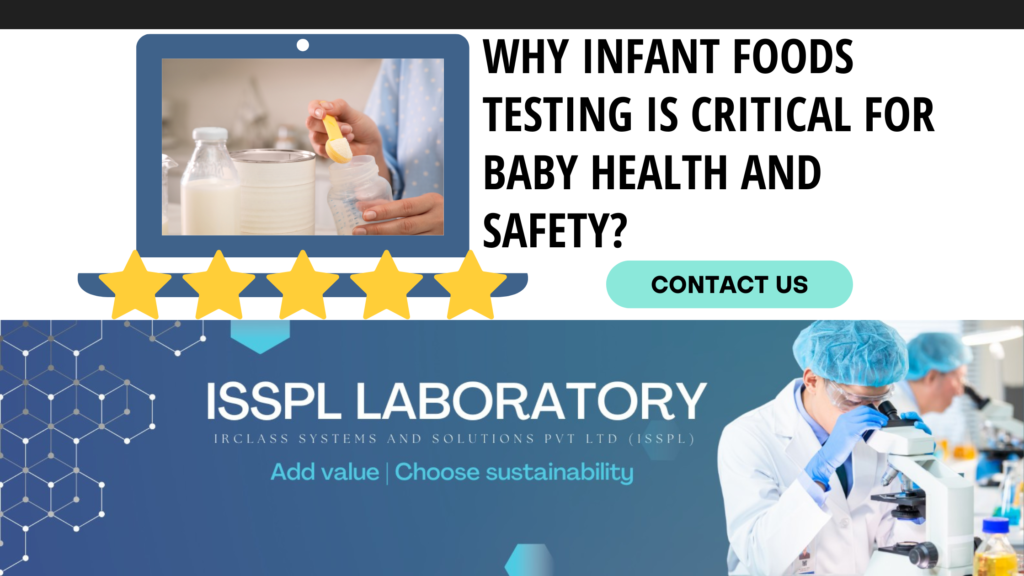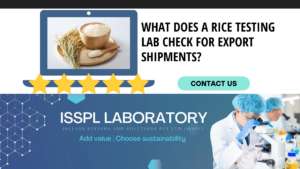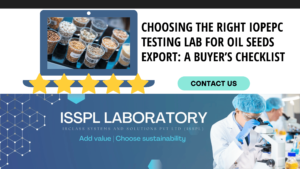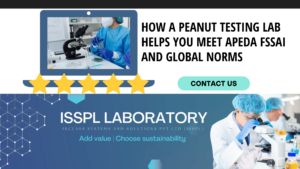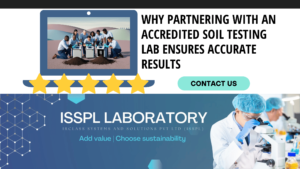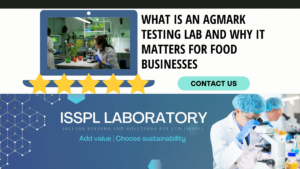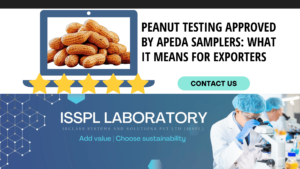An Overview by Team ISSPL - Analytical Testing Laboratory in India
ToggleAs the health and safety of our diet are becoming increasingly important, testing baby food has become an essential part of ensuring that the most vulnerable members of society are shielded from toxicants, allergens, or nutritional deficiencies.
Babies are still at a stage in their life where their immune system and organs need to be developed, hence they get very prone to contaminants, low-quality ingredients, or malnutrition.
Testing the infant foods in the right manner is not regulatory compliance; it is his human duty to safeguard the well-being of future generations. In this blog, we will find out the significance of testing infant food and how it affects the baby’s health & safety.
1. Nutrition Info Verification
Infant nutrition is very important because of the rapid growth and development during this period. This includes the proper ratio of proteins, fats, and carbohydrates, and vitamins and minerals to support growth including brain development and immune function in infants.
Role of Testing in Adequate Nutrition
Baby food testing checks whether the nutritional properties declared in the label of baby foods are consistent with their true content. This would stop companies from feeding misleading information to parents and give babies the nutrients they need for healthy growth. Infant malnutrition results in lingering effects such as developmental delay, cognitive deficiency, and impaired immune system.
B. Nutrition for Each Life Stage
Testing also allows manufacturers to tweak formulations for different stages in development. The nutritional requirements of a newborn generally differ from those of a 5 or 6-month-old infant. This type of food testing is necessary to ensure that the formulations fit the dietary needs of every age.
2. Avoiding Risks of Contamination and Poisoning
Contamination is one of the most critical issues in baby food production. Food can be contaminated at the raw material, manufacturing process, or packaging stages. Half of them were confirmed as having contaminated food, which presents a great danger to infant health and can induce short-term or long-term diseases.
A. Heavy Metals and Chemical Contaminants.
Heavy metals such as lead, arsenic, mercury, and cadmium are prevalent in food pollution cases and can pose a serious risk to infants. These metals are known to disrupt neurological development and can lead to chronic disease. This considerate form of infant food testing seeks to identify the contaminants and manage them to keep the products safe for consumption.
B. Bacterial and Fungal Contamination
For infants, immune systems are not well developed so consuming products with these pathogens can be dangerous. Full testing will be done to determine any bacterial or fungal contamination that may cause food poisoning. As you know, even small infections can be quickly complicated by severe dehydration or deadly outcomes in newborns therefore the bacterial analysis of the sample is very important.
3. Global Standards and Regulatory Compliance
Infant foods vary in regulations from country to country where each is governed by different laws on safe infant food. These protocols make sure the producer follows best practices to supply nutritious and safe goods and products.
A. Meeting FDA and International Standards
Infant food products are highly regulated in the U.S. and this strict rule market is governed by the Food and Drug Administration (FDA). These rules relate to everything from where ingredients are sourced and how they are processed, to how the finished product is packaged and labeled. Likewise, other regulatory bodies like the European Food Safety Authority and Codex Alimentarius have introduced similar guidelines to protect the health of infants. Carrying out stringent tests and following these guidelines is how manufacturers guarantee they reach global compliance and maintain the highest levels of safety.
B. Testing of Additives and Preservatives
Most baby food products contain thickeners, stabilizers and taste enhancers to prolong the storage life or improve consistency. Although generally fine in food products, the use of these as sweeteners in children is closely regulated. These are the same things that infant food testing looks at to make sure they are present not only in quantities appropriate for a baby to eat but also do not have long-lasting effects on the health.
4. Allergen Detection
Infants are particularly at risk for allergies because many food allergies develop during childhood. Cow’s milk, soy, wheat, tree nuts, and shellfish are some common allergens. If not caught, these allergens can lead to extreme allergic reactions in infants — from hives to anaphylactic shock.
A. Relevance of Allergen-Free Products
Most of these allergen checks in infant food testing enable the guarantee that when a food is labeled as “allergen-free” it truly is devoid of all of these true offenders. Infants with these conditions can have dangerous and immediate reactions, so in this case, food labels and testing are essential.
B. Cross-Contamination
However, products not formulated with allergens may contain trace amounts of them due to cross-contamination during production. It is part of the testing to make sure that food processing establishments|commingle |do not commingle allergens with baby foods.
5. Addressing Mislabeling and Fraudulent Claims
Especially for infants, consumers count on the labels when deciding which food products to buy. However faulty labelling could be misleading, and in certain cases also dangerous. For example, falsely advertising that a product is organic, chemical-free, or high in certain nutrients.
A. Fraudulent Claim Testing
It allows infant food testing for accurate reflection of the claims being made on the packaging and in advertising. Food manufacturers are subject to periodic audits by regulatory agencies to confirm that claims like “organic,” “non-GMO” and “fortified with vitamins and minerals” are true. This is important for creating and retaining consumer trust, especially with sensitive populations like babies.
B) Reducing the probability of consumer misinformation
Correct testing and labeling can assist parents in preventing products from falling below their standards for health, safety, and more importantly scandals. When it comes to testing infant food, a distinct guarantee that what is on the label coincides with what is in the package.
Conclusion
To sum up, baby food testing is critical to ensure the safety and health of infant growth. This process is essential in defending infants at their most fragile time of life: from contamination prevention to nutritional accuracy, allergen detection, or label claim verification.
Parents should have confidence in what their baby is eating, and meticulous testing of infant food guarantees that safety — building trust, and protecting the future generation.
To mitigate with the same, Laboratories such as ISSPL Lab conduct these critical tests to ensure every product is at the highest safety and quality standard for parents to confidently make an informed choice on their baby’s health and well-being.
